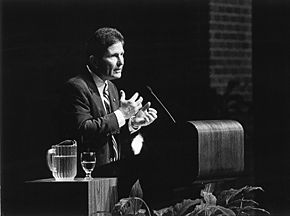
While praising the UW as "an even better institution than I thought it was when I arrived a year ago," McCormick warned that a combination of economic, demographic, technological and ideological forces have made new demands on the University.
"We have to select from these pressures and demands and turn them into opportunities," he declared.

The President listed many negative images that higher education faces in late 20th century America, such as that it is "lazy, elitist, arrogant, irrelevant and politically correct." Critics say it has evaded the pain of re-engineering that has transformed much of American industry. Some feel that higher education has got to "shape up," doing more with less and doing it better, he reported.
While dismissing most of those impressions as mistaken, the President added, "The fact is we have to do some of this. We must improve student access to courses so that they can graduate in four years. We have to accept the need and urgency for accountability."
In addition to being more accountable to the people of the state, the UW must also meet expectations for access to higher education. Because of the "baby boom echo" and limits on government spending, there is increasing demand to attend college while limited state resources to pay for it, he noted.
McCormick lamented the fact that in Washington, the percentage of state general fund dollars going to higher education has declined significantly over the last decade. While K-12 education has a constitutional provision requiring full funding, "there is no built-in growth factor for higher education," the President said. "Higher education has been traditionally the budget balancer in Olympia."
The UW's budget proposal in Olympia is his number one priority, the President said, but it is not a "panacea." To address access issues internally, the President listed the following proposals:
* Increase productivity through technology and other means.
* Promote better use of UW facilities during the summer, evening and weekends. "Converting summer quarter to a regular quarter could address the challenge of access," he said. The President has already appointed a task force to study the conversion.
* Impose "moderate and predictable" increases in student tuition.
* Increase the amount of non-state and private funds coming to the UW.
* Reallocate existing resources to where they are needed the most.
To some critics of higher education, increasing productivity means measuring faculty work in a single dimension, McCormick said. Many point to the number of hours faculty are in the classroom.
The President call such measurements "simple minded" and that critics want to "count if students are in their seats, not what is in their brains." He called for measurements of output, not input, noting that the UW does very well on surveys of recent graduates.
In discussing faculty and staff, the President said his highest priority in the next legislative session is better salaries. "Faculty salaries have stagnated," he said, noting that the average UW professor's pay is three-quarters of the way down the list of top U.S. research universities. "This is totally unacceptable," he declared.
While the President promised to defend tenure, he asked for more flexibility in how the faculty do their work. "In ten years I predict there will be more variations in faculty roles and rewards than we have today," he said.
The President said the UW must also preserve and strength research and scholarship, "think hard" about teaching and increase the racial diversity of the faculty and staff.
"Hard choices are required. There will be some conflicts even here in the peaceable Northwest," he said.
The President called for "boldness" in making a case to the people of the state. He pointed to Initiative 601, passed in 1993, which limits state spending in a formula based on inflation and population growth. "Those who supported 601 said it would not hurt higher education," McCormick said. Warning that 601 may put a budget squeeze on higher education, he added, "Those people who made that claim should be the first to step forward to make changes."
To ensure the excellence of the UW, "we will need brains, hard work and courage, none of which is in short supply, I am a happy to say," he added.
The promise of higher education is part of the American dream. If the UW accomplishes its missions of teaching, research and public service, "people will have better and more rewarding lives because of our efforts," he said.
McCormick's address to the UW was part of a series of conversations he has had across the region and the state. In September and October, the President held community meetings in Lynnwood, Bellevue and Auburn. He is planning community meetings in the city of Seattle in the near future.
Full Text of President's Address to the UW Community
Send a letter to the editor at columns@u.washington.edu.